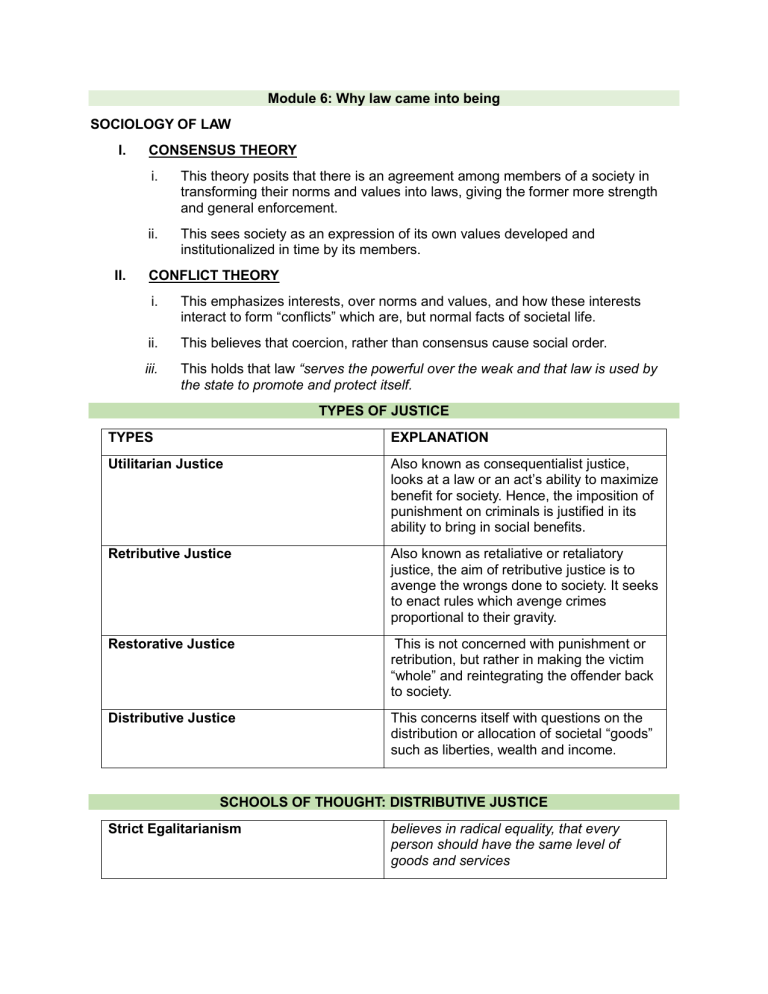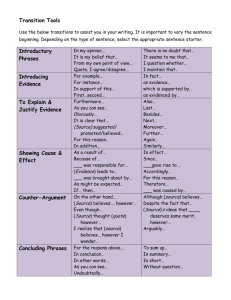
Module 6: Why law came into being SOCIOLOGY OF LAW I. II. CONSENSUS THEORY i. This theory posits that there is an agreement among members of a society in transforming their norms and values into laws, giving the former more strength and general enforcement. ii. This sees society as an expression of its own values developed and institutionalized in time by its members. CONFLICT THEORY i. This emphasizes interests, over norms and values, and how these interests interact to form “conflicts” which are, but normal facts of societal life. ii. This believes that coercion, rather than consensus cause social order. iii. This holds that law “serves the powerful over the weak and that law is used by the state to promote and protect itself. TYPES OF JUSTICE TYPES EXPLANATION Utilitarian Justice Also known as consequentialist justice, looks at a law or an act’s ability to maximize benefit for society. Hence, the imposition of punishment on criminals is justified in its ability to bring in social benefits. Retributive Justice Also known as retaliative or retaliatory justice, the aim of retributive justice is to avenge the wrongs done to society. It seeks to enact rules which avenge crimes proportional to their gravity. Restorative Justice This is not concerned with punishment or retribution, but rather in making the victim “whole” and reintegrating the offender back to society. Distributive Justice This concerns itself with questions on the distribution or allocation of societal “goods” such as liberties, wealth and income. SCHOOLS OF THOUGHT: DISTRIBUTIVE JUSTICE Strict Egalitarianism believes in radical equality, that every person should have the same level of goods and services All humans are socially and politically equal. The Difference Principle This permits inequalities of wealth and income if those inequalities benefit the worst-off group in society. Desert-Based Principle focuses on merit or effort or some other quality as the basis for desert Libertanianism represents another approach to distributive justice, likely to endorse some version of what is called the equal liberty principle believes that each individual should have an equal right to basic liberties MODULE 7: GETTING TO KNOW YOU THE LEGAL PHILOSOPHERS LEGAL PHILOSOPHER PHILOSOPHY Plato “No law or ordinance is mightier than understanding”. The true function of law is to produce men who are completely good. Laws that do not incline to this end are not laws. A bad law is no law. He does not accept anything less than complete goodness in men. Aristotle “Plato is dear to me, but dearer still is truth”. “A state is not a mere society having a common place, established for the prevention of mutual crime and for the sake of exchange…political society exists for the sake of noble actions, and not of mere companionship”. Plato’s student, responded to the Platonic ideal that only the wise could rule and regarded the ideal as unrealistic. A realist, his solution was to strengthen law and make it the regulator of human conduct; proposes to make a law stable enough to withstand the fickle passions of the people. St. Thomas Aquinas “Law: an ordinance of reason for the common good, made by him who has care of the community”. ‘Laws can be unjust because they are contrary to the divine good… In no way is it permissible to observe them’. He believes that true law comes from the eternal law of God, the “Divine Reason” that governs the universe. For him, laws are needed because human laws could not completely govern a man’s conscience. Thomas Hobbes “Covenants without the sword are but words, and of no strength to secure the man at all”. He believes that the safety of the people is the supreme law. For him, law is simply the command of the sovereign and that the liberty of the people consists in what is not prohibited by law. Law is not counsel, but command, not of any man to any man, but of him whose command is addressed to one formerly obliged to obey him. He believes that no one can make laws, but the state or sovereign, whom the people owe absolute obedience in exchange for peace and security. He equates the state of nature to one where man’s eqoism reigns. John Locke “Every man has a property in his own person. This nobody has the right to, but himself’. He believes that laws are established to protect people’s properties. The chief end of men in uniting into commonwealths and putting themselves under government is the preservation of their property; to which in a state of Nature, there are many things wanting. He believes that all men are created equal by God even in that state of nature. The equality of men by Nature is so evident in itself, and beyond all question… it is the foundation of that obligation to mutual love amongst men. Charles de Montesquieu “Countries are well cultivated, not as they are fertile, but as they are free”. “Liberty is the right to do as the law permits.” The author behind the doctrine of separation of powers. He believes that for a state to most effectively promote political liberty, the powers of the executive, legislative and judiciary must be given to separate bodies acting independently, yet, connectedly through a system of checks. For him, the people cannot feel safe or free if two or three of the governmental powers are vested in a single person, evinced in the saving power corrupts, absolute power corrupts absolutely. Jean Jacques Rousseau “ Man was born free, and everywhere he is in chains”. For him, man is naturally good, but he has been corrupted and perverted by society. For him, the “first of all laws is to respect the laws”; it is to law alone that men owe justice and liberty. The power of the laws depends more on their wisdom than on the severity of their administrators.. the severity of penalties is only a vain resource, invented by little minds in order to substitute terror for that respect which they have no means of obtaining. Immanuel Kant “So act as to treat humanity.. as an end withal, never as a means only.” For him, no trait or talent in this world may be called good “without qualifications”, except a “Good Will”, “Intelligence, wit, judgment and other talents of the mind’, or “courage, resolution, perseverance as qualities of the temperament” are good and desirable” but these gifts of nature” may also become ‘extremely bad’ and ‘mischievous” if the will which is to make use of them is not good. He distinguishes between subjects with free will and objects without will. Georg Wilhelm Friedrich Hegel “The question “To whom… belongs the power of making a constitution? Is the same as ‘Who has to make the Spirit of a Nation”…. It is the indwelling spirit and the history of the Nation- which is that Spirit’s history – by which constitutions have been made and are made”. He is a German philosopher and sometimes called the prophet of revolutionary change. He believes that the world is continuously evolving, and puts becoming above being. For him, history is the movement integrating the thesis, with its antithesis to form a synthesis. The latter in turn attracts a new antithesis to form a new synthesis. Development took place through the dialectic of thesis (the basic situation or concept), antithesis (contradiction) and synthesis (the resolution of the contradiction). The progress of all events and concepts including that of law, moves in this triad of development.




